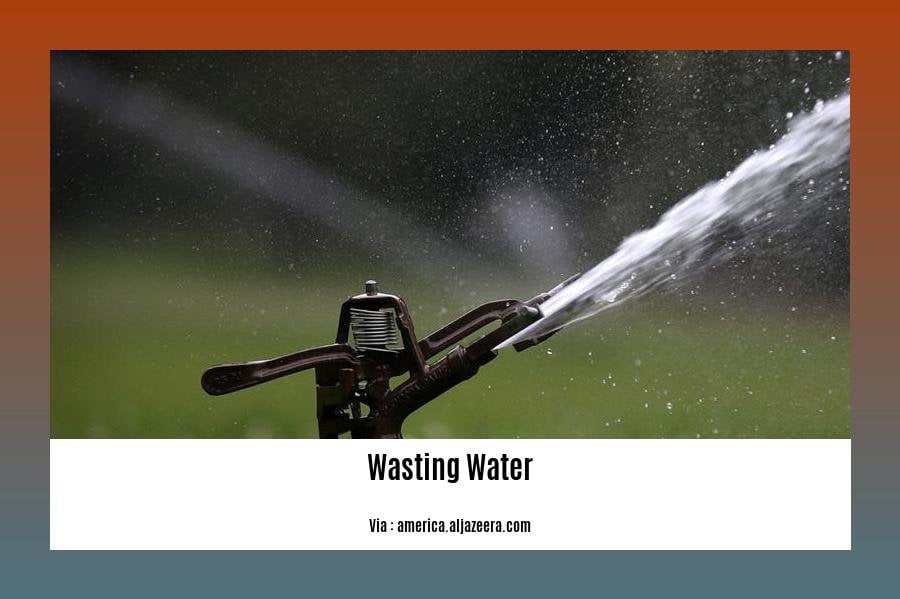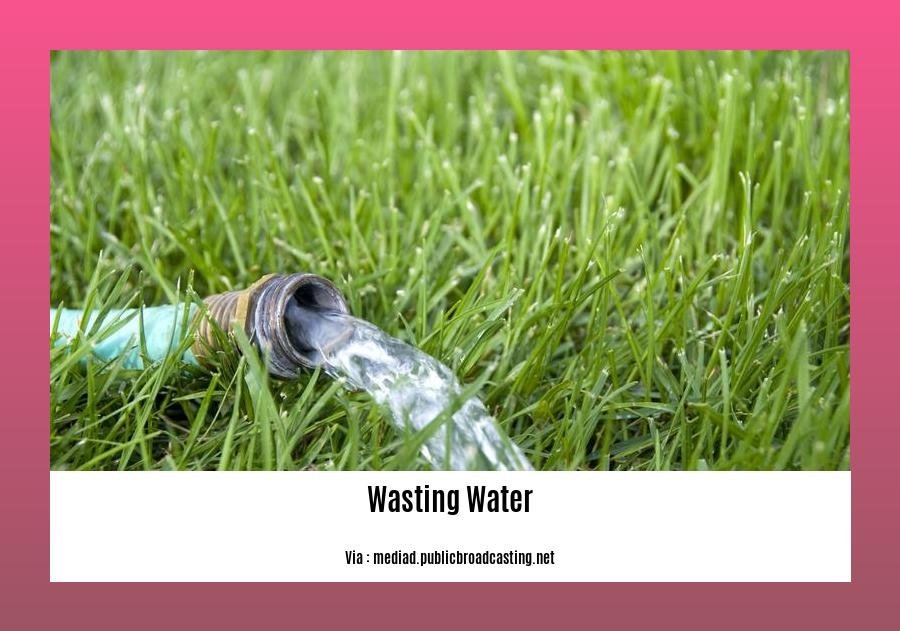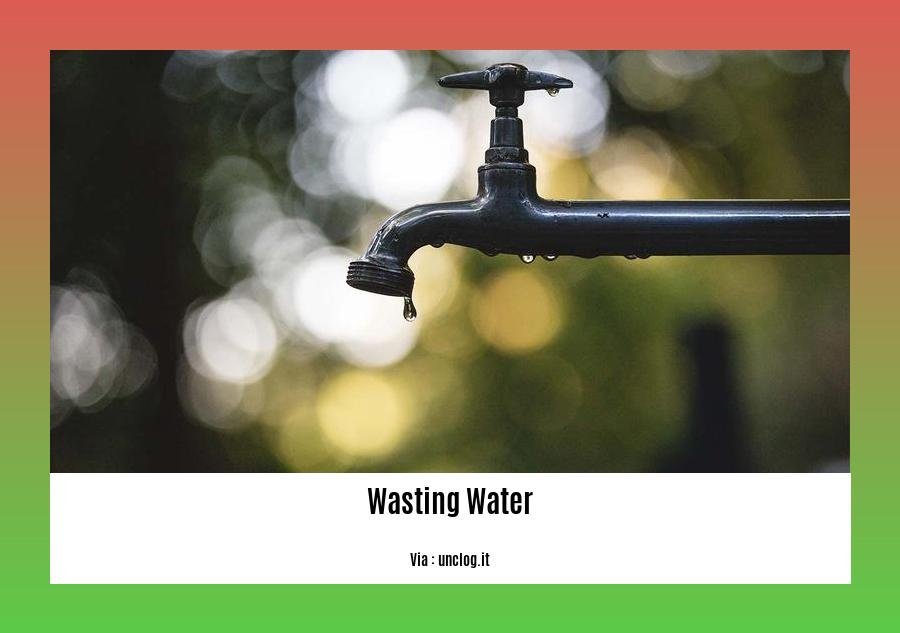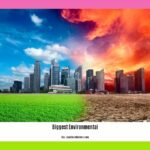Human activity is progressively endangering a valuable resource that keeps life on Earth possible: water. We explore in this post the terrible results of water waste and the main negative effects of this careless activity. From the loss of natural water supplies to the aggravation of water shortage and the great stress on ecosystems, water waste has far-reaching effects. Come explore with us the immediate need for water conservation as well as the quick actions people and societies must take to guarantee a more sustainable future.
Key Takeaways:
- Depleting fresh water resources: Wasting water leads to the depletion of available fresh water, which is vital for human survival and various ecosystems.
- Increasing energy consumption: Treating, pumping, and heating water requires a significant amount of energy. Wasting water unnecessarily results in increased energy consumption and greenhouse gas emissions.
- Disrupting habitats: Water wastage can disrupt habitats such as rivers, lakes, and wetlands, affecting the plants and animals that rely on them.
- Putting stress on ecosystems: Decreased water availability due to wastage puts stress on ecosystems, making them more vulnerable to environmental challenges.
- Affecting food production: Water is essential for agriculture, and wasting water can negatively impact food production, potentially leading to food shortages and higher prices.
- Contributing to climate change: Excessive water wastage contributes to climate change through increased energy consumption, greenhouse gas emissions, and altered hydrological cycles.
- Giving rise to tension and conflict: In water-scarce areas, wastage can create tension and conflict among communities competing for limited water resources.
- Limiting water availability to other communities: Wasting water limits its availability to other communities, particularly in regions already experiencing water scarcity.
- Damaging arid ecosystems: Arid ecosystems are fragile, and water wastage further damages them, leading to desertification and loss of biodiversity.
- Increasing energy usage in sewage treatment plants: Treating wastewater requires energy, and wasting water leads to increased energy usage in sewage treatment plants.
- Being an economic burden: Water wastage is an economic burden, resulting in increased water bills and costs for individuals and businesses. It also leads to decreased agricultural production and revenue loss.
Disadvantages of Wasting Water

The elixir of life, water is a priceless resource that keeps not only human civilization but also the fragile equilibrium of our ecosystems. But the general culture of water waste is leading to effects that endanger our surroundings. The concerning negative effects of water waste and their broad consequences will be discussed in this paper. Let us so explore the terrible results of this careless behavior.
1. Reducing Fresh Water Resources
Wasting water results in the reduction of the fresh water that is still accessible—a necessary resource for many ecosystems including human survival. Wasteful habits like leaving taps running or over-irrigating lawns cause great demand on freshwater supplies like rivers, lakes, and aquifers. Meeting the water needs of a rising population gets more difficult when this priceless resource runs out. Moreover, the loss of freshwater supplies disturbs fragile ecosystems depending on these water bodies for their existence.
2. Rising Fuel Consumption
Treating, pumping, and heating water call for a lot of energy. Wasting water needlessly raises energy use and the related greenhouse gas emissions. Consider the all the effort required to clean and move water to our houses. We not only squander a precious resource when we waste water but also help to create the carbon footprint connected with water companies. This energy use aggravates the difficulties presented by climate change even further.
3. Disturbancing Habitats
Water waste can disturb ecosystems including wetlands, lakes, and rivers, therefore influencing the plants and animals depending on them. These ecosystems are rather linked. Any disturbance in the water availability can have terrible consequences on the flora and wildlife that name these environments their habitat. Dependent on a specific water level species could suffer, which would have a knock-on effect across the ecosystem.
4. Affecting Ecosystems Stress
Reduced water availability brought on by waste strains ecosystems and increases their sensitivity to other environmental problems. Ecology suffers to adapt as water becomes scarce, which increases vulnerability to contamination, invading species, and habitat loss. When we waste this priceless resource, the delicate web of life depending on water supply gets caught in a vicious circle of degradation.
5. Influencing Agricultural Production
Agriculture depends on water, hence wasting it might affect food output and cause possible food shortages and more expensive prices. Globally, the agriculture industry uses a good share of the water resources. Less water accessible for irrigation from wasted water influences crop yields and food output. Any disturbance in the supply of water for agriculture can have far-reaching effects on food security and cost affordability given the rising global population.
6. Promoting Climate Change
Through changed hydrological cycles, higher energy usage, and greenhouse gas emissions, excessive water waste fuels climate change. As was already noted, our carbon footprint increases with the energy needed to heat, pump, and purify water. Furthermore, the change in hydrological cycles brought about by water waste disturbs weather patterns and increases the frequency and intensity of extreme occurrences such floods and droughs.
7. Triggering Tension and Conflict
Wastage can cause friction and conflict among people vying for few water supplies in locations where water scarcity is frequent. Many places of the world deal with water shortage. Wasteful water consumption aggravates already existing tensions and could cause disputes between countries and even between people. This compromises not only peace but also initiatives toward cooperation and sustainable development.
8. Restrain of Water Availability to Other Communities
Water waste reduces its availability to neighboring communities, particularly in areas already suffering water shortage. By using careless water consumption, we rob others of their access to this essential resource. Wasting water worsens the hardships previously experienced by existing underprivileged populations in areas where water shortage is common, therefore sustaining social and economic inequities.
9. Degrading Arid Ecosystems
Already vulnerable arid environments are damaged by water waste, which causes desertification and loss of biodiversity. Water waste has larger effect on arid areas. Even a small disturbance in the restricted water availability can cause desertification, therefore endangering the livelihoods of people and jeopardizing the special biodiversity of these delicate ecosystems.
10. Increasing Sewage Treatment Plant Energy Consumption
Wastewater treatment calls for energy, thus squandering water causes sewage treatment plants to need more of that energy. More wastewater is created when water is squandered needlessly, which increases the energy needed for treatment. This energy usage strains our already limited resources—in terms of water as much as energy itself.
11. Creating Economic Stress
An economic load, water waste drives rising water bills and expenses for both households and companies. It also causes lost income and worse agricultural output. Waste of water has financial ramifications at several levels. Water bills grow personally when we squander this valuable resource. Globally, companies pay more for operations; the agricultural sector suffers lower yields, which lowers income and can cause possible economic instability.
Ultimately, squandering water has several negative consequences on the environment, including diminishing resources, upsetting habitats, influencing food production, aggravating climate change, and generating financial obligations. We have to change our excessive water consumption and adopt conservation techniques if we are to create a sustainable future for present generations as well as for next ones. Valuing water and implementing smart consumption practices can help to guarantee the availability of this vital resource for all life on Earth. Let us thus maximize every drop.
There are different types of water quality tests that you should know about. From testing for bacteria to measuring pH levels, these tests provide valuable insights into the safety and purity of your water. Learn more about the different types of water quality tests here.
Hard water may have its disadvantages. From leaving mineral deposits on your faucets to reducing the effectiveness of your cleaning products, the impact of hard water can be frustrating. Discover the disadvantages of hard water in points here.
Soft water may seem beneficial, but there are also some downsides. It can lead to excessive sudsing, which can make rinsing clothes and dishes more difficult. Explore the disadvantages of soft water here.
The Impact on Ecosystems

One valuable resource keeping life on Earth is water. But our reckless water consumption has serious effects on the ecology especially. Water waste disturbs the fragile equilibrium of these ecosystems and causes major ecological issues. Let’s explore the negative effects of water waste and grasp why the health of our planet depends critically on water conservation.
Freshwater Resource Depletion
Water waste causes our freshwater supplies to run low. The availability of clean, safe water for irrigation, drinking, and other vital purposes gets restricted as we waste water. This shortage affects not just people but also aquatic environments and species depending on these water supplies[^1].
Alteration of Habitats
Wastewater disturbs ecosystems and habitats. When too much water is wasted, aquatic environments—including rivers, lakes, and wetlands— suffer from lower water availability. The plants and animals depending on these ecosystems suffer as a result of this disturbance, therefore reducing the biodiversity[^1].
Anxiety on Systems
Water waste causes stress that further strains ecosystems. From habitat conservation to nutrient cycling to water purification, many biological processes depend on water. These processes are disturbed when water is squandered, therefore compromising the general resilience and health of ecosystems[^1].
Partition of Climate Change
Through higher energy use and greenhouse gas emissions, water waste fuels climate change. Carbon dioxide and other greenhouse gases are emitted into the environment by the energy consumed in water collecting, treatment, and distribution. These emissions aggravate the consequences of climate change and help the world to warm[^1].
Finally.
Waste of water on ecosystems has terrible effects. It disturbs habitats, degrades our freshwater supplies, and strains the fragile equilibrium of ecosystems. We all have to help to minimize these effects by means of sustainable water use policies and water conservation.
Key Takeaways:
- Wasting water depletes fresh water resources, affecting both humans and ecosystems[^1].
- Habitats and ecosystems suffer from disruption when water availability decreases[^1].
- Ecosystems face additional stress due to water wastage, impacting their health and resilience[^1].
- Water wastage contributes to climate change through increased energy consumption and greenhouse gas emissions[^1].
Energy Wastage in Water Treatment and Distribution
One should never take for granted the essential resource water is. But our negligent water use has major effects on our energy use as well as the surroundings. The negative consequences of water waste on distribution and energy consumption will be discussed in this paper. Examining this issue will help us to better appreciate the reasons for the need of adopting sustainable practices and water preservation.
the Nexus of Energy-Water
We also add to the energy waste when we squander water. From pumping and filtration systems to heating applications, treating and distributing water calls for a lot of energy. Every drop of water that is needlessly squandered becomes wasted energy[^1].
Emissions of greenhouse gases and processing expenses
The emission of greenhouse gases produced by water treatment is one of its key drawbacks since they harm the surroundings. The energy consumed in water treatment operations raises processing expenses and adds to greenhouse gas emissions. This compromises not only the surroundings but also our financial capacity[^2].
Alternatives to Reducing Environmental Impact
Fortunately, there exist substitutes that lessen the effect of wastewater treatment on the surroundings. Adverse environmental effects can be lessened onsite by use of organic load to generate energy, nutrient recycling, and water reuse. These creative ideas provide a water treatment system with higher sustainability and energy efficiency[^3].
Difficulties and Future Research Projects
Although methods of wastewater treatment have advanced, problems still exist. Particularly pH control stays difficult for implementing modern technologies. More investigation in this field will help to raise the effectiveness and efficiency of water treatment techniques. Future study and development should also give land, air, water, and human health top importance when considering wastewater treatment[^4].
Sustainable Methods and Water Saving
Water conservation must be given top priority if we are to offset the bad effects of water waste. Effective ways to cut water waste and lower energy consumption are fixing leaks, running water-efficient appliances, applying water-saving techniques in agriculture, and encouraging water-saving behaviors among people and societies[^5].
Key Takeaways:
- Wasting water leads to increased energy consumption and greenhouse gas emissions associated with treating and distributing water.
- Water wastage disrupts habitats and ecosystems, negatively impacting plants and animals that rely on water bodies.
- Decreased water availability due to wastage puts stress on ecosystems, making them more vulnerable to environmental challenges.
- Wasting water negatively affects food production, potentially leading to food shortages and higher prices.
- Water wastage contributes to climate change, both through increased energy consumption and altered hydrological cycles.
- In areas with water scarcity, wastage can create tension and conflict among communities.
- Wasting water limits its availability to others, especially in regions already experiencing water scarcity.
- Water wastage damages arid ecosystems, leading to desertification and loss of biodiversity.
- Treating wasted water in sewage treatment plants increases energy usage.
- Water wastage is an economic burden, leading to increased water bills, costs for individuals and businesses, decreased agricultural production, and loss of revenue.
References:
– WaterFilterGuru: Environmental Consequences of Wasting Water
– ScienceDirect: Review of water treatment methods with a focus on energy
The Financial Costs of Water Waste
Although water is an essential resource for human existence, misuse of it has major financial consequences. The financial expenses related to water waste will be discussed in this paper together with the reasons behind the need of addressing this problem.
The Cost of Wasted Water
Water waste might result in unanticipated costs and increased bills. While prolonged leaks can cause severe structural damage needing costly repairs, a damaged plumbing system may cause regular repairs at a great cost[^1]. These extra expenses can rapidly mount up and tax both personal and corporate budgets.
Locating and Stopping Leaks
Avoiding water waste and the financial load it causes depends on finding and stopping leaks. Leaks can be found by homeowners tracking water use, routinely checking plumbing fittings, and employing leak detecting devices[^2]. Early leak repairs help people avoid the needless costs of wasted water.
Conserving Water for Economic Gain
Saving water not only benefits the surroundings but also helps to lower expenses. Simple steps like installing water-efficient fixtures, quickly addressing leaks, and adopting water-conservation behaviors could result in big savings[^3]. These ideas will help people and companies cut their water costs and help to create a more sustainable future.
Appreciating Wastewater for Guideline Advice
Policymakers and investors need to be able to make wise judgments by means of the economic valuation of wastewater. It underlines the requirement of appropriate wastewater treatment and its related financial advantages by comparing the cost of no action with the cost of efficient wastewater management[^4]. Understanding the financial worth of wastewater management will help us to provide sustainable solutions that cut waste top priority importance.
Value of Good Wastewater Management
Particularly in underdeveloped metropolitan areas where a sizable fraction of wastewater is dumped untreated into water bodies, untreated wastewater in cities is a major issue[^5]. This emphasizes the need of efficient wastewater treatment to guarantee water quality and reduce the financial loads related with insufficient treatment.
Key Takeaways:
- Wasting water can lead to higher bills and unexpected expenses, straining individuals and businesses financially.
- Detecting and preventing leaks is crucial to avoid wasted water and the subsequent financial burden.
- Saving water through water-efficient fixtures, prompt leak repairs, and water-conservation habits can result in significant cost savings.
- The economic valuation of wastewater helps inform decision-making and emphasizes the importance of proper wastewater management.
- Effective wastewater management is crucial to maintain water quality and mitigate the financial consequences of inadequate treatment.
References:
- The Water Scrooge. (n.d.). The Long-Term Financial Impact of Water Waste for Property Owners. Retrieved from source
- How to detect leaks?. (n.d.). Retrieved from source
- How to save water?. (n.d.). Retrieved from source
- UNEP. (2015, October 19). Economic Valuation of Wastewater: The Cost of Action and the Cost of No Action. Retrieved from source
- UN-Water. (n.d.). Water and Ecosystems. Retrieved from source
FAQ
Q1: What is the environmental impact of water waste?
A1: Water waste has a variety of negative environmental consequences, such as the depletion of fresh water resources, the increase in energy consumption, the disruption of habitats, the stress on ecosystems, the impact on food production, the contribution to climate change, the emergence of tension and conflict, the restriction of water availability to other communities, the damage of arid ecosystems, and the increased energy consumption in sewage treatment plants.
Q2: What is the impact of water waste on climate change?
A2: Climate change is exacerbated by the consumption of energy and the emission of greenhouse gases as a result of water waste. Carbon dioxide and other greenhouse gases are released into the atmosphere as a result of the energy required to treat, pump, and distribute water, which exacerbates the effects of climate change.
Q3: What are the economic consequences of water waste?
A3: Increased expenses and higher expenditures may result from water waste. A plumbing system that is compromised may necessitate frequent repairs at a substantial cost, while persistent leaks can cause severe structural damage that necessitates costly repairs. Significant cost savings can be achieved by promptly repairing leakage and implementing water-saving practices.
Q4: What is the environmental impact of effluent treatment?
A4: The treatment of wastewater necessitates a substantial quantity of energy, which contributes to greenhouse gas emissions. Furthermore, untreated wastewater is a significant issue in urban areas, particularly in impoverished regions, where a substantial amount of wastewater is discharged into water bodies without treatment. Effective wastewater management is essential for the preservation of the environment and the integrity of water.
Q5: What are the advantages of water conservation?
A5: Conserving water not only contributes to environmental preservation but also results in cost reductions. Individuals and communities can significantly reduce their environmental impact and save money on water bills by installing water-efficient fixtures, promptly repairing leaks, and exercising water-conservation habits.
q
- Mastering Leader in Spanish: The Complete Guide - April 19, 2025
- Uncovering Surprising Parallels: England Size Compared to US States - April 19, 2025
- Old Mexico Map: Border Shifts 1821-1857 - April 19, 2025
















